The Minnesota Wild have an interesting case in defenseman Matt Dumba, and an examination of his 2018-19 campaign is vital in determining whether or not it could have been an outlier. Could there have been factors such as deployment, systems or just pure luck that played into the sharpshooting defenseman being on pace for over 30 goals over 82 games?
Related: Revisiting the Brent Burns Trade
The Wild are searching for a first-line center, so if Dumba or fellow defenseman Jonas Brodin are not moved via trade for a center, one will need to be moved before the upcoming Seattle expansion draft in order to avoid the loss of a top-four defenseman for nothing. So with that being said, it is very important to determine whether or not Dumba can replicate the previous season’s success.
The Past — How Dumba Became a Polarizing Top-Four Defenseman
The Wild’s first-round selection in the 2012 Draft took a little time to elevate his game when he entered the NHL, but he eventually solidified his role as a top-four defenseman in 2016. In his first three seasons in a Wild sweater, he accumulated 44 points in 152 games.
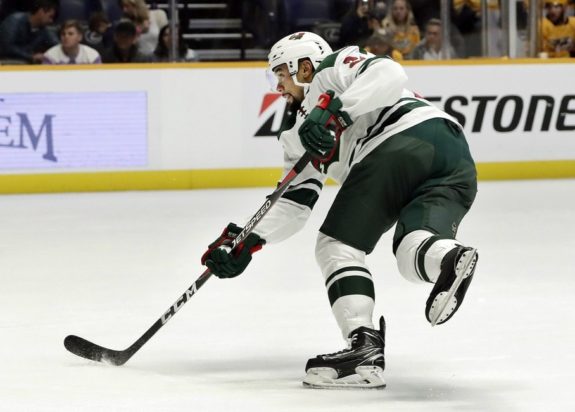
The puck-moving defenseman signed a five-year, $30 million contract back in July of 2018 that secured him a lucrative contract with financial security for the coming years. The first two seasons have been underwhelming – the first season was cut short due to injury, and, this season, he never really regained his form post-injury.
It also benefited the Regina native that he had Jared Spurgeon and Ryan Suter alongside to help with his development. Dumba, a four-time double-digit goalscorer, is also known for his physical presence, particularly in his own end – he registered 136 hits in the 2017-18 season. He’s recorded 174 points in 411 games in his career to date.
The Season-Ending Injury & His Game Now
In December of 2018, Dumba fought against Matthew Tkachuk because of bad blood from the previous game, and it resulted in a season-ending injury that inevitably derailed the Wild. He suffered a ruptured pectoral muscle that eventually required surgery, which occurred a few weeks later before the New Year.
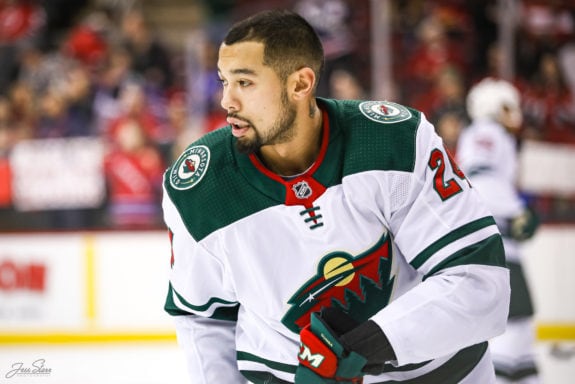
Dumba has not been the same since that fight – he has had a good stretch of games here and there but in reality, he has yet to regain his form. All you have to do is tune in to a game and you can see the struggles of Dumba as his frustration is evidently displayed – his face shows it all. He went almost three months without a goal this season, and that caused mass frustration. He finally ended the goalless drought in overtime against the Blackhawks in early February.
Related: Fuzzy History of the NHL Playoff Beard
Dumba’s struggles this season ranged from lack of accuracy of his shot to horrific defensive play in his own end, which included his positioning and his hesitance to throw his body around.
So, Was The 2018-19 Campaign An Outlier Or A Predictor Of The Future?
Dumba was on the verge of having a career year in 2018-19 before his injury, collecting 12 goals and 10 assists for 22 points in 32 games. He was on pace for just over 30 goals – was that a possible feat, and could it be sustainable from season to season?
Before the season, he had a career shooting percentage (S%) of just over 8.0 percent. He finished the 2018-19 season with a S% of 12.9. This could be seen as quite a concern as this is potentially unsustainable.
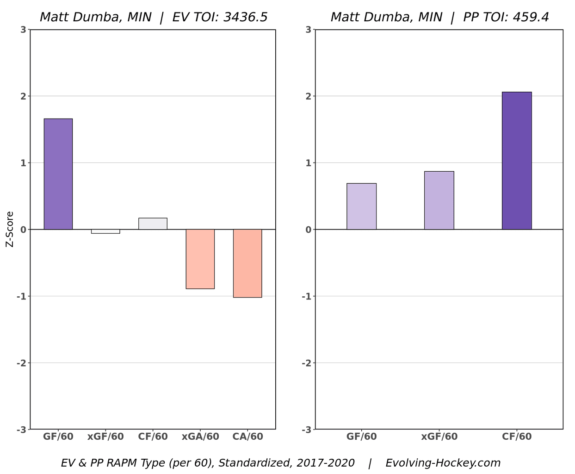
It is very fair to say that the offensive defenseman is very dependent on his tantalizing shot which can explain why there is such a discrepancy between his expected and actual goals for. He is also a power-play specialist and is vital in maintaining the flow during the power play – he is a valuable asset to any power play due to his mobility and lethal shot. It is also important to note that his expected goals are higher than his actual goals on the power play, which displays that he is good at driving play and creating chances with the man advantage.
Dumba also has his struggles defensively, likely because of his positioning. He is not very good in his own end, to say the least, and while his defense may improve in the future, he likely will always have his defensive flaws because he likes to jump up in the rush and keep pucks in the offensive zone.
In the 2018-19 campaign, Dumba had a higher expected goals than actual goals, which is very important to note as he was not as dependent on his shot and was creating quality chances offensively.
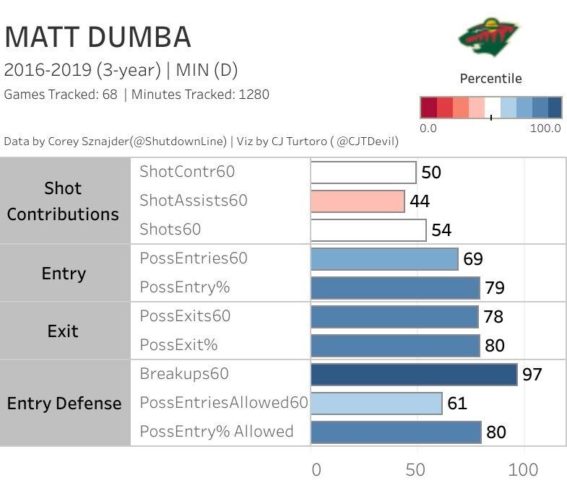
One other feature Dumba has is the mobility which causes him to be a strong player in transition – his entry and exit transitions are strong and a valuable aspect of his game. Having a good transition game is very important – it helps create goals and get the team from end to end effectively in breakouts. One other aspect is his entry defense and his ability to retain possession and protect the puck from opponents in the offensive and neutral zone.
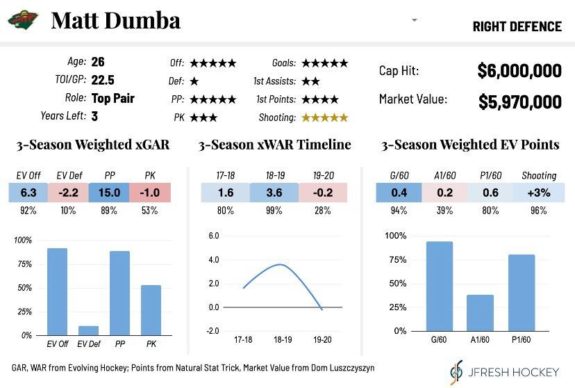
Dumba, who will turn 26 Saturday, has three years remaining beyond this season at a $6 million average annual value. So while it is evident from the above image that he is not a strong defensive player, his offense brings a ton of value.
Future Trajectory
There is no doubt that there is some concern regarding Dumba and whether the 2018-19 campaign was an outlier or a predictor to a very bright future. He also reminds me of Brent Burns, who didn’t reach his peak until arguably his age-29 season. If this were the case for Dumba, he still has time to grow his game and become a fully developed NHL player.
So while he is not great defensively, Dumba’s explosiveness, physicality, superior transition game and tantalizing shot all make him incredibly valuable. His shooting percentage is clearly unsustainable but I don’t think Dumba’s pre-injury performance is unrealistic to expect in the future.
Related: The Best NHL Defensemen Ever
While I am not sure whether Dumba could reach the 30-goal feat, which he has come out publicly and said he can, he will be a strong offensive player with his shot in the forefront of his numerous qualities.
If this remains true, the Wild will be in a tough spot whether to keep their up-and-coming star defenseman, or trade him to allow room to extend one of the best defensive defensemen in the NHL in Jonas Brodin.